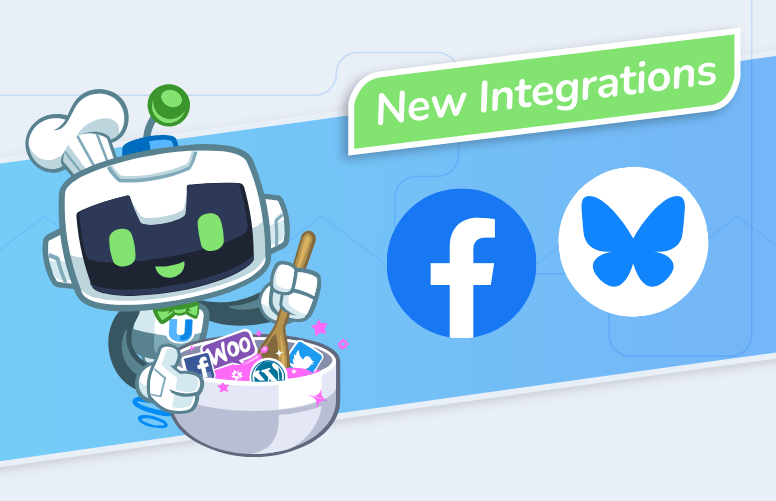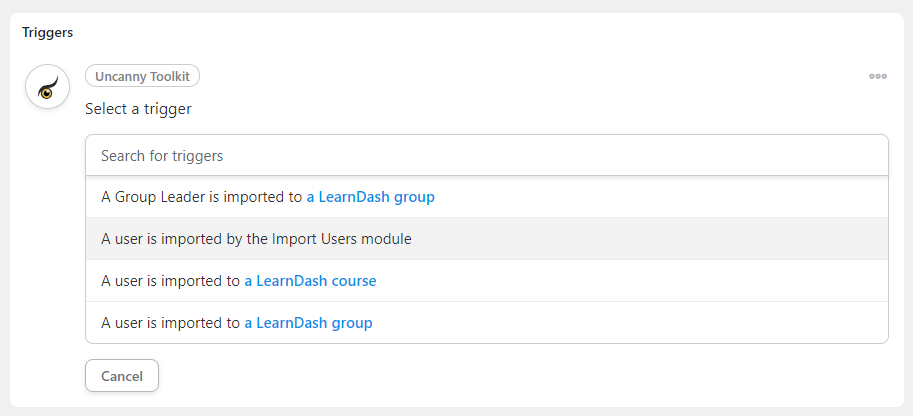Automator 6.4 : Publicités Facebook, Bluesky et puissantes améliorations de l'apprentissage en ligne
Uncanny Automator 6.4 introduit les publicités Facebook Lead, Bluesky et des tonnes de nouveaux déclencheurs puissants et…
Uncanny Automator 3.4 is out with a new game-changing feature: you can run actions on multiple users at once, on demand.
But first, let’s get the bad news out of the way: this new feature, while in the free version of Uncanny Automator, is only available to users of our Uncanny Toolkit Pro plugin. As such, it is currently limited to LearnDash users who also happen to be running our Toolkit plugins, but we will make a version of it available to all Automator users in the near future.
Do you ever wish Automator could run actions on a set of users, not just when they perform actions, but whenever you want to? Maybe you want to add a set of users to a BuddyBoss group, enroll them in a Zoom meeting, reset their progress in a LearnDash course, export user records to Google Sheets, etc. That’s what this update allows; when you upload a list of users in a CSV file, Automator runs actions against them.
The new integration works with our Import Users module of Toolkit Pro and adds the following new triggers:
It’s the first one that’s going to get the most attention, but the others are important to make sure we cover a variety of conditional situations. What these triggers say is that when a user is imported using our tool, it can pass through any actions that you set up in a recipe.
The only column that our importer requires is an email address, so this means that you can import a simple list of email addresses and the recipe will perform the actions against all users in the import file. Don’t worry, it doesn’t slow down the import process; actions are queued and performed in the background so that the site’s performance isn’t affected and there’s no risk of a timeout. Everything just works.
The possibilities are endless, and for LearnDash users specifically, this solves a lot of problems around performing bulk actions. Sites offering compliance training now have a way to batch reset user progress. Sites migrating to LearnDash can use imports to mark lessons, topics and courses complete to preserve progress. Site admins can issue certificates in bulk.
One important note is that you will want to be careful with how you set up these recipes and disable them after use. If you want to run an import and only have it perform the actions once for users, make sure you disable the recipe after your import, otherwise it will run the actions against your next import too.
Based on user feedback, we added a few other important improvements to this release. In Hubspot, we caused some early frustration with that integration by forcing site owners to choose between creating or updating a user–but not both. Now, when an action can create a contact or user, there’s a new checkbox that says, “If the contact already exists, update their info.”
WPForms gains new tokens for the form title, form ID and URL. And WordPress core adds a token for the comment contents for the “A user submits a comment on a post” trigger.
While perhaps not as visible to most users, we have added vastly improved error messaging (with specific instructions for next steps if anything fails during recipe creation), fewer API calls when viewing the dashboard, and even some accessibility improvements to improve placeholder contrast.
For the full list of changes in the Uncanny Automator 3.4 release, make sure to visit our changelog.

Uncanny Automator 6.4 introduit les publicités Facebook Lead, Bluesky et des tonnes de nouveaux déclencheurs puissants et…
Nous utilisons des cookies pour améliorer votre expérience sur notre site. En utilisant notre site, vous acceptez l'utilisation des cookies.
Gérez vos préférences en matière de cookies ci-dessous :
Les cookies essentiels permettent des fonctions de base et sont nécessaires au bon fonctionnement du site Web.
Les cookies statistiques collectent des informations de manière anonyme. Ces informations nous aident à comprendre comment les visiteurs utilisent notre site web.
Les cookies marketing sont utilisés pour suivre les visiteurs sur les sites web. L'objectif est de diffuser des publicités pertinentes et attrayantes pour chaque utilisateur.

Cet article a 0 commentaire